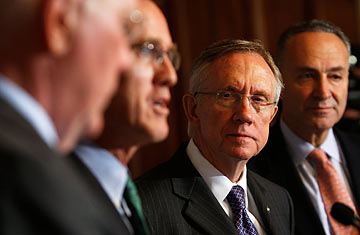
Senate majority leader Harry Reid, third from left, listens as Consumers Union president and CEO Jim Guest, second from left, speaks during a news conference unveiling the Health Insurance Industry Antitrust Enforcement Act of 2009
Insurers are furious that Senate majority leader Harry Reid's health-care-reform bill will include a public option — even though it lets states opt out if they don't want the government-run insurance alternative. Liberals are ecstatic with Reid over that same public option — even though opt-out states would be able to keep their markets completely private, which would limit the public plan's power to negotiate volume-based discounts in other states.
It's an impressive bipartisan consensus regarding the power of inertia. For all the disagreements over the public option, almost everyone agrees that making it the default is a big deal, and that the compromise allowing opt-outs is a pretty modest compromise. That's because reams of studies have shown that default settings really, really matter. If Reid's legislation had omitted a default public option but allowed states to opt in if they wanted one, insurers would be ecstatic and liberals would be furious.
The classic example of the power of the default is the opt-out 401(k) savings plan. In a 2001 study, only 36% of the participants signed up for a retirement savings plan when they had to opt in — even though their employers were matching their contributions. Free money, and only 36% took it! But when participants were automatically signed up for the same plan but given the chance to opt out, 86% of them stuck with it. Scholars have found similar status-quo results with organ donations. If we have to sign up, very few of us become organ donors. If we have to opt out, most of us remain organ donors. Similarly, when our electronic gadgets come with the energy-saving auto-power-down function enabled, we're cool with that; if we have to enable it ourselves, we rarely bother.
This kind of behavior doesn't fit into neoclassical economic models, which assume that human beings are rational agents who act in their own best interests. In the real world, human beings are human beings. Sometimes we're too dumb to know our own best interests. Sometimes we're too lazy to slog through the forms to figure out our own best interests. Often we're conformists; we assume the default must be the default because that's what most people do, and we're desperate not to be social deviants.
These insights are at the core of the challenge to traditional neoclassicism posed by behavioral economics, which has burst into prominence in the Obama Administration. Budget director Peter Orszag is so obsessed with defaults that he used to bring a copy of that 401(k) study to all his meetings; chief regulator Cass Sunstein co-authored a book called Nudge that's all about defaults and other noncoercive policies that can promote desired behaviors. The Administration has pushed one nudge after another, from simplified financial-aid forms after studies showed they could increase college-attendance rates to automatic savings plans for small businesses. It even doled out our payroll-tax cuts in the stimulus bill by decreasing our weekly withholding rather than cutting us big lump-sum checks, because the research suggested we'd be less likely to notice it and more likely to spend it.
Orszag has been particularly enthusiastic about the potential for health-related nudges to help "bend the cost curve," the soaring costs of care that are bankrupting the Treasury. For example, Medicare and Medicaid patients who don't select their insurance plans could be defaulted into low-cost options, and computerized medical records could prompt doctors to prescribe generic drugs, while still allowing them to select name brands instead. The thinking is that they usually won't, and they usually shouldn't.
There is, however, one big difference between the Reid legislation and other opt-out strategies: a state is not a person. An individual might end up in a public-health plan out of pure inertia, but it's not clear whether a conservative state like Louisiana would exhibit the same status-quo tendencies. Governor Bobby Jindal is an outspoken opponent of the public option, and an ambitious politician; Louisiana legislators might be eager to distance themselves from President Obama and the Democratic Congress.
But states are subject to inertial forces too. Passing a bill is always a lot harder than not passing a bill. There can be procedural roadblocks, financial roadblocks, legal roadblocks and political roadblocks. History has shown that states can be as dumb, lazy and conformist as the people who live in them, regardless of their real or perceived interests. Politics is often an unpredictable business. You think you know what's going to happen, but then there's a surprising poll, a crucial indictment, a backroom deal.
So insurers can't be sure what the various states will do, and neither can liberals. But both sides know that states, like all of us, tend to err on the side of doing nothing.
